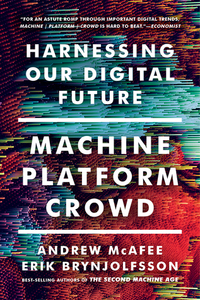Take a photo of a barcode or cover
26 reviews for:
Machine, Platform, Crowd: Harnessing Our Digital Future
Erik Brynjolfsson, Andrew McAfee
26 reviews for:
Machine, Platform, Crowd: Harnessing Our Digital Future
Erik Brynjolfsson, Andrew McAfee
Although it treads similar ground to their earlier book, The Second Machine Age, McAfee and Brynjolfsson have created an excellent guidebook to a few key current technical trends for less technical readers. While there aren't extensive technical details, the book provides very focused coverage on people versus machines for knowledge work, products versus platforms, and crowd sourcing. Machine, Platform, Crowd provides an excellent opportunity for business people or technical people not already steeped in these areas to come up to speed quickly on them. The summaries and questions at the end of each chapter are particularly well suited to business readers.
The largest media company in the world, Facebook, does not create any of its media. The largest transportation company in the world, Uber, does not own a single car. The largest accommodation company in the world, Airbnb, does not own a single building. The world’s largest retailer, Alibaba, does not own a single warehouse. That’s how the book starts and immediately grabs our attention that something very strange is going on in the business world. In the rest of the book the authors gradually expose various aspects of what they call the second machine age, and does it with precision and lucidity. Unlike most other books in this genre, it does not unnecessarily fatten it up with endless examples, and treats its readers with adequate respect, while still making it accessible to non-technical readers. It is not only a great read for people in the business, but I think anyone living in today’s world would find the book insightful and extremely engaging.
Uma continuação do [b:The Second Machine Age: Work, Progress, and Prosperity in a Time of Brilliant Technologies|23316526|The Second Machine Age Work, Progress, and Prosperity in a Time of Brilliant Technologies|Erik Brynjolfsson|https://images.gr-assets.com/books/1444712959s/23316526.jpg|25222314], com desdobramentos sociais do mundo tecnológico moderno. Não me acrescentou tanto quanto o primeiro – que foi de longe um dos livros mais influentes que li – mas trouxe boas ideias. Ele é na verdade um bom apanhado de ideias que circulam em outros livros, mas resume todas elas bem, de forma que conta por uns 10 livros do gênero.
Tem um pouco sobre internet e plataformas dominando a mediação de transações, o que é discutido mais a fundo nos livros do [a:Tim Wu|303279|Tim Wu|https://images.gr-assets.com/authors/1290062566p2/303279.jpg]. Tem um pouco sobre bitcoins e novas plataformas, como [b:Blockchain Revolution: How the Technology Behind Bitcoin Is Changing Money, Business, and the World|25894041|Blockchain Revolution How the Technology Behind Bitcoin Is Changing Money, Business, and the World|Don Tapscott|https://images.gr-assets.com/books/1460909417s/25894041.jpg|45776054] e [b:The Age of Cryptocurrency: How Bitcoin and Digital Money Are Challenging the Global Economic Order|22174460|The Age of Cryptocurrency How Bitcoin and Digital Money Are Challenging the Global Economic Order|Paul Vigna|https://images.gr-assets.com/books/1410981914s/22174460.jpg|41521398] explicam. Fala sobre algoritmos e como predições automáticas podem ser melhores que o julgamento humano, como [b:Rise of the Robots: Technology and the Threat of a Jobless Future|22928874|Rise of the Robots Technology and the Threat of a Jobless Future|Martin Ford|https://images.gr-assets.com/books/1411605128s/22928874.jpg|42498449] explica, ao mesmo tempo que levanta os pontos negativos de [b:Weapons of Math Destruction: How Big Data Increases Inequality and Threatens Democracy|28186015|Weapons of Math Destruction How Big Data Increases Inequality and Threatens Democracy|Cathy O'Neil|https://images.gr-assets.com/books/1456091964s/28186015.jpg|48207762]. E por aí vai.
Enfim, se quiser ler uma intro sobre novas tecnologias e como o mundo deve mudar pelos próximos 10 anos, é um livro bem legal.
Tem um pouco sobre internet e plataformas dominando a mediação de transações, o que é discutido mais a fundo nos livros do [a:Tim Wu|303279|Tim Wu|https://images.gr-assets.com/authors/1290062566p2/303279.jpg]. Tem um pouco sobre bitcoins e novas plataformas, como [b:Blockchain Revolution: How the Technology Behind Bitcoin Is Changing Money, Business, and the World|25894041|Blockchain Revolution How the Technology Behind Bitcoin Is Changing Money, Business, and the World|Don Tapscott|https://images.gr-assets.com/books/1460909417s/25894041.jpg|45776054] e [b:The Age of Cryptocurrency: How Bitcoin and Digital Money Are Challenging the Global Economic Order|22174460|The Age of Cryptocurrency How Bitcoin and Digital Money Are Challenging the Global Economic Order|Paul Vigna|https://images.gr-assets.com/books/1410981914s/22174460.jpg|41521398] explicam. Fala sobre algoritmos e como predições automáticas podem ser melhores que o julgamento humano, como [b:Rise of the Robots: Technology and the Threat of a Jobless Future|22928874|Rise of the Robots Technology and the Threat of a Jobless Future|Martin Ford|https://images.gr-assets.com/books/1411605128s/22928874.jpg|42498449] explica, ao mesmo tempo que levanta os pontos negativos de [b:Weapons of Math Destruction: How Big Data Increases Inequality and Threatens Democracy|28186015|Weapons of Math Destruction How Big Data Increases Inequality and Threatens Democracy|Cathy O'Neil|https://images.gr-assets.com/books/1456091964s/28186015.jpg|48207762]. E por aí vai.
Enfim, se quiser ler uma intro sobre novas tecnologias e como o mundo deve mudar pelos próximos 10 anos, é um livro bem legal.
I was kind of underwhelmed by the book, but then again I am essentially doing my PhD research in the area so very little was new. Still, I think it’s a wonderful overview of three of the most influential systems that are going to shape our future, so I recommend it especially to those who are not used to reading about technology. It’s extremely accessible!
This book does a great job of examining three trends the authors feel are having the biggest impact on business and society. The first is the growing use of machine learning algorithms. Instead of relying on the HiPPO (highest-paid person's opinion) data driven algorithms are being used to automate more decision making and in fields not previously thought possible. There are missteps as bias in algorithms can amplify issues but once corrected can avoid those same issues. Meanwhile the ability to create free, perfect, and instant copies of content on various platforms is changing many industries. Additionally the network effect is allowing platforms to easily displace incumbents if there is no perceived difference. Lastly the collective intelligence of everyone connected to the Internet is changing what is means to be an expert. The impact of technology on our lives continues to grow and as these three areas demonstrate we need to be asking the question "What do we want to do with technology?" instead of letting ourselves continue to be controlled by it.
An excellent synthesis of three key trends
I had heard good things about the book but never got around to reading it until I found out that it was on the syllabus for a grad-level class at ASU. I decided to give it a look and I was instantly hooked. The authors write in a clear style that is anything but academic. What's more, they did quite a bit of research. McAfee and Brynjolfsson don't make broad pronouncements. Rather, they back up their assertions and with plenty of examples, some of which I hadn't heard of before.
This is an excellent synthesis of three key trends and I need to read their prior one.
I had heard good things about the book but never got around to reading it until I found out that it was on the syllabus for a grad-level class at ASU. I decided to give it a look and I was instantly hooked. The authors write in a clear style that is anything but academic. What's more, they did quite a bit of research. McAfee and Brynjolfsson don't make broad pronouncements. Rather, they back up their assertions and with plenty of examples, some of which I hadn't heard of before.
This is an excellent synthesis of three key trends and I need to read their prior one.
Can't read these kind of management lite books any more. As one reader said of you have even a passing familiarity with any of the three topics you're wasting your time.
Read this book for an MBA course - the course was actually structured entirely around the book, spending thirds diving into the machine, platform and crowd. This book is a must-read for business professionals and anyone interested in learning more about our digital future. Insightful and easy to digest. Highly recommend!
Very thought provoking and changed some of my views on digital. Loved the summary and questions at the end of each chapter...really brought it to life.
I put this book out of conceptual-ideation shelf (kinda implicative book review).




